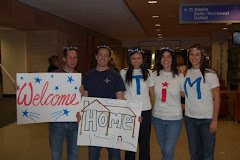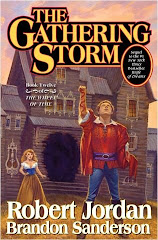.JPG)
July 27
We bounce around in the back of an MRAP as we head down a rough stretch of road in Southern Diyala. Half of today's survey of what the battery commander hopes will one day be a major economic thoroughfare for agricultural traffic between Baqubah and Baghdad will consist of this: counting (whether by sight or feel) potholes, bumps, divots, and ruts along a 20 km stretch of some of the worst driving surface you'll ever see. We quickly give up trying to catalogue every single defect and instead focus on the broader task at hand. For the majority of the distance, the road sits atop a soil berm. Parts are gravel, other sections have been paved with varying degrees of success. The difficulties of this project will be numerous, likely leading to a hefty price tag when we complete our project scope of work package and estimate back at home station. While the hope is to rely on materials and labor from a local asphalt plant and the large pool of available (jobless) able-bodied local workers, the reality is they may not be able to put forth a bid that competes with the big boys from Baghdad. The result would be another missed opportunity to pour some much needed Iraqi and American capital into this still very troubled region. Where the payments for terrorist activities are still large, it is crucial that the government steps in with other alternatives for work. This being estimated as a multi-million dollar job we know that it is a long shot to even get approved. As you could imagine the amount of red tape in the way of construction projects increases exponentially with price. For now, as we continue to bang around in the back of the MRAP, we focus on the pictures and video that will enable us to turn in the best project package we can. After that, it will be out of our hands.
Since July 1st all movements into or through Iraqi towns have required both Iraqi Army (IA) approval and escorts. Often coordination with Iraqi Police (IP) is also a prerequisite to investigate a potential job site as is visiting with and obtaining the blessing of other local leadership (mayor, sheik, etc). Missions are delayed or turned back on a daily basis, a source of great frustration to the soldiers here. Today we are lucky. Our IA escorts are ready to go when we arrive at their post and the police chief and mayor are waiting for us when we got to their village to check out another project on our list.
.JPG)
It's 8 am and the police chief is all smiles. He's a really friendly guy, acknowledging everyone in the room and motioning for us to take our seats, a conglomerate of couches and plastic lawn chairs with cushions spaced around the perimeter of the room with low tables for drinks and ashtrays for smokers. It's an arrangement of furniture similar to all of the other meeting rooms we've visited. The Army captain traveling with us explains to the police chief through the interpreter who we are and what we are there to accomplish and he thanks us in advance for our engineering efforts. Without a word, a man I presume to be the neighborhood sheik walks in and sits next to me as they continue to talk.
Although this is my first visit to this particular town, our Army escorts are clearly not strangers here. The captain and police chief discuss old business, security issues and insurgent activity in the area, things they have likely discussed many times before. As a young man passes out chai and orange soda to us, a young girl walks in and stands next to the police chief. She's probably about 8 years old and it quickly becomes clear that she is his daughter. In bits and pieces I overhear her story.
Six years ago, she was a passenger in the backseat of her father's car when an assassination attempt was made on his life. The car was shot up and it caught on fire and although they both escaped with their lives, she sustained severe burns to her body in multiple locations. The Army captain has promised to take photos of the girl back to a doctor on post to see if skin grafts would be possible for the girl's face, scarring which I only noticed when I knew to look for it. Her father, no doubt, assumes the scarring will scare away her suitors later in life, leaving her without a husband. Through hand motions and the interpreter, they motion for her to show them the wounds. Shy, but unafraid, the girl takes her hair out from the high pony tail she's put it up in revealing a large bare patch of skin on the top of her head. They take pictures of this and her face, as well as the backs of her arms, her back, and legs. The physical pain having waned, and showing none of the emotional scars one might expect from a child who suffered such a traumatic episode, the girl is unfazed by the experience, unashamedly displaying her wounds.
Like any other young girl she seems to enjoy being the center of attention. When a soldier reaches into his pocket and pulls out a small tin filled with candy for her she playfully hurries over to him and accepts it, smiling coyly and saying thanks over her shoulder as she shows it to her father. While the discussion returns to other issues, security of the town, infrastructure needs, etc, she remains the center of attention for the rest of our stay there. Another soldier gives her a granola bar and she proudly displays them both to other children who have wandered into the room. I'm not sure she knows what is in the tin. I see her shrug when the other children point to it. But its hers, and she spins it like a top on the table as our conversation comes to a close.
Its 8:30 now, and our captain politely offers to get out of the police chief's hair so he can get to work. Whether culture or kindness compels him, I do not know, but it doesn't shock me when the chief reacts to our departure with a question: "What? You're not staying for lunch?" It's 8:30 am. Time for us to get to work...
.jpg)
...I only much later learned the true story behind the name of the bridge we descend upon down the hill several miles from the police chief's village. Apparently the previous battery commander (also an Army captain) started calling it by his last name and it stuck. We, of course, assumed it was named for the town it was in. I still have no idea what it is actually called. What it is, though, is a collection of about fifteen cast iron pipes, about 4 feet in diameter, held together by a layer of top-soil and gravel that together span this narrow point on the Diyala River. Discarded pipes strewn about the site, crushed or broken are testament to the fragility of the span. Still, cheap and reliable, especially lately during these recent years of drought where the water level has remained consistently low year-round, this solution to the age-old transportation question, how to get to the other side, is every bit as ingenious as the similar log and pole bridges we've seen across canals throughout the region. As a permanent solution to the movement of goods across the river, however, this solution is lacking. The Army smartly took one look at the bridge and opted to keep their heavy machines off of it saving them from a very wet accident I'm sure.
.jpg)
Outside home station, I have had very little opportunities to be around water in nature. We have flown over canals and once it may have rained a few drops, but the general lack of seeing rushing water of any kind makes today something of a treat. The water level is clearly low here. Lines on the bank display that if the water were to rise again to past heights, the bridge and all of us would be under water. For now, the river crawls beneath us. Trickling through the pipes, a collection of rocks, vegetation, trash, and debris on the other side creates something of a waterfall as the river tumbles several feet down the other side. There, the water ponds and then continues heading south towards Baghdad. Two men look up at our gathering on the bridge from where they're resting beside their sheep who are drinking and feeding at the water's edge. Around me is a rather absurd collection of personalities. I would probably stare too.
.jpg)
Along with the dozen or so soldiers who have made their way down with us to the bridge and taken up sentry posts at various positions all around, and us (two Air Force engineers who barely stand out from the group), we have along with us Iraqi Army soldiers in blue, black and white fatigues, some with red berets, others with green helmets, others hatless. Additionally, police men (boys?) who man the shack at one end of the bridge have joined the gaggle. They stand out in their long-sleeve bright blue shirts and dark slacks and carry their AKs low and at their sides like Super Soakers. The town sheik, police chief, and his daughter have also joined the fray. At one point while poking around along the side of the bridge I look back and see the whole lot of them holding hands for a picture. The Army captain is second from the left. To his left is the sheik, holding his hand and beaming. The captain looks a little less comfortable but he grits his teeth and smiles right on with him...
.JPG)
...Two hours later, having made it back down the broken road, we're back on our cots changing into pts and talking about the sights and sounds of the day. For the soldiers traveling with us, today was recess, a welcomed break from a normal day of work that doing training exercises with the IA or maintenance work on the vehicles. Today they were just along for the ride, serving as our escorts so we could take our photos and do our measurements like overly curious tourists with bodyguards. Riding back, I overheard their stories about home ad nauseam as they look forward to the end of their tour in a month and a half. Right now I'm just glad to be back in the relative safety of this wooden hut. I may have been doing this for a while now, strapping up, guns loaded, eyes up, adrenaline pumping, but there's no way that I'll ever get used to it and there's no way that every time I get home, take off my helmet and vest, put my gun back on the rack, and sit down, I don't take a deep breath and say a quick prayer of thanks for making it through another day.
.JPG)
.JPG)
.JPG)
.JPG)
.JPG)
.JPG)
.JPG)
.JPG)
.JPG)
.JPG)
.JPG)

